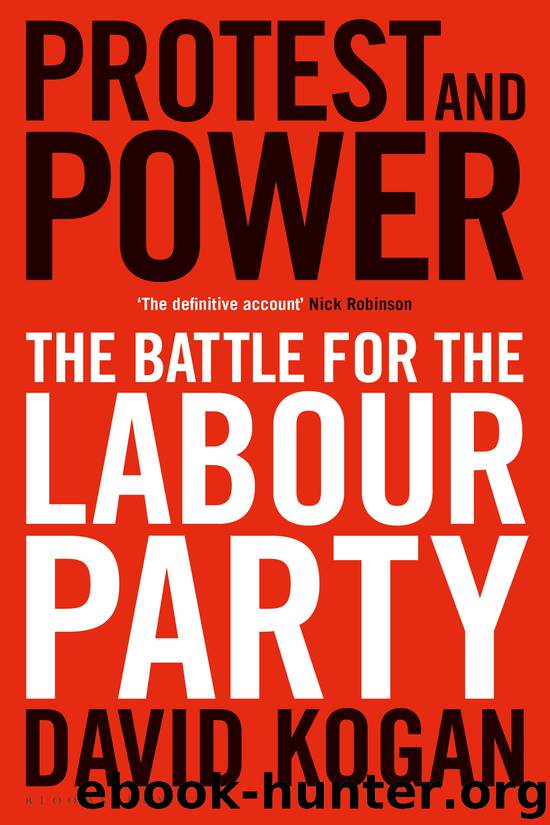Protest and Power by David Kogan

Author:David Kogan
Language: eng
Format: epub
Publisher: Bloomsbury Publishing
24
Throwing it Away
After the frenetic search for parliamentary nominations, the role of the unions in the left’s fledgling campaign was beginning to be much more important. They had felt betrayed by New Labour but still wanted an electoral winner to support. Andy Burnham looked the obvious candidate for unions on the centre-left, with Yvette Cooper potentially commanding support from the centre-right. The Collins report had created a situation where individual voting replaced the electoral college, but the unions still had money, resources and influence over their members.
At the start of the campaign, Andy Burnham had received verbal support from Unite’s Len McCluskey. Then, on 21 May, Burnham issued a declaration turning down any union financing for his campaign.
I am not going to take any money from the trade unions in this leadership campaign. No money has been offered, but if it was, I would encourage it to be given to the Labour party to assist the rebuilding after the election. But I am actively seeking the support of individual trade union members and am pleased they have a bigger say in this contest.
He wanted to stress his independence and assumed that as there was no candidate to his left, the unions would either have to support him or remain neutral.
What I have decided is a risk, but it is a sign of my confidence and openness that this contest is conducted in the right way. If I take no money from the unions, I am not dependent on them, and that will put me in a stronger position to defend unions and to defend the union link in the future, which I intend to do.
This was an entirely self-inflicted tactical error. Like David Miliband in 2010, Andy Burnham wanted to lay the ground of being a party leader and prime minister before he’d actually won the post. He would not be open to attack from the Conservatives on this issue if he won. One left union leader, Manuel Cortes of the TSSA, had already declared his personal support for Jeremy Corbyn on 10 June through Labour List, the Labour news website:
Labour MPs have a duty to ensure that party members get the widest possible choice when electing a new leader . . . we want Labour MPs to have the guts to have that debate.
This was more than a month before his executive confirmed the union’s official nomination but in the meantime, Cortes gave space in his office building to Corbyn’s campaign.
After the nominations closed on 15 June, the groundswell of support came as the Labour party itself went through a massive growth spurt. The transformation in the party from May through August 2015 was seismic. Throwing the doors open to a new class of supporter paying only £3 had turned Labour into a mass party at lightning speed. By September, the Labour party had 550,816 supporters, of whom 292,505 were fully paid-up members, 147,134 affiliated supporters via the trade unions and 110,827 who had paid their £3 as new supporters who could vote in the leadership election.
Download
This site does not store any files on its server. We only index and link to content provided by other sites. Please contact the content providers to delete copyright contents if any and email us, we'll remove relevant links or contents immediately.
The Secret History by Donna Tartt(19088)
The Social Justice Warrior Handbook by Lisa De Pasquale(12190)
Thirteen Reasons Why by Jay Asher(8909)
This Is How You Lose Her by Junot Diaz(6886)
Weapons of Math Destruction by Cathy O'Neil(6279)
Zero to One by Peter Thiel(5801)
Beartown by Fredrik Backman(5754)
The Myth of the Strong Leader by Archie Brown(5507)
The Fire Next Time by James Baldwin(5444)
How Democracies Die by Steven Levitsky & Daniel Ziblatt(5218)
Promise Me, Dad by Joe Biden(5153)
Stone's Rules by Roger Stone(5087)
A Higher Loyalty: Truth, Lies, and Leadership by James Comey(4962)
100 Deadly Skills by Clint Emerson(4925)
Rise and Kill First by Ronen Bergman(4788)
Secrecy World by Jake Bernstein(4753)
The David Icke Guide to the Global Conspiracy (and how to end it) by David Icke(4717)
The Farm by Tom Rob Smith(4509)
The Doomsday Machine by Daniel Ellsberg(4490)
